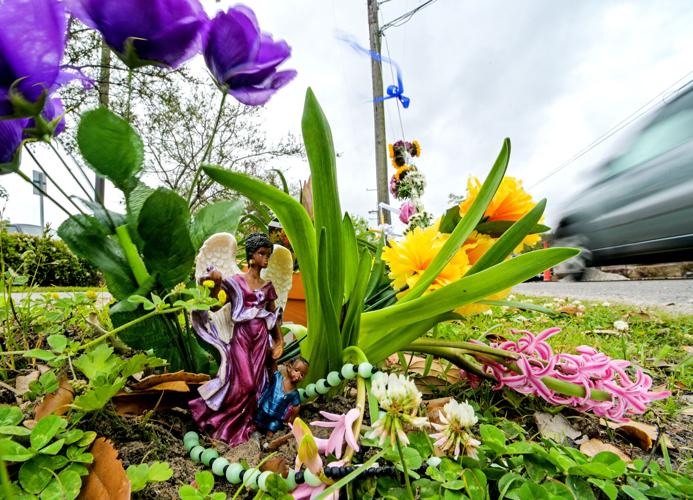Three of the teenagers accused of killing Linda Frickey during a brutal New Orleans carjacking pleaded guilty to reduced charges on Monday, as prosecutors and defense attorneys selected the 12 jurors who will decide the fate of their alleged accomplice.??
Briniyah Baker, 17, Lenyra Theophile, 16, and Mar'Qel Curtis, 16, had each been charged as adults with second-degree murder for their role in the attack on Frickey, 73, who died March 21, 2022, after she was carjacked on Bienville Street and dragged alongside her stolen SUV.
But as jury selection was set to begin in Orleans Parish Criminal District Court Monday morning, prosecutors announced the girls intended to plead guilty to attempted manslaughter and accept sentences of 20 years in prison each.
The agreement, which was assented to by Frickey’s family and accepted by Judge Kimya Holmes, followed a weekend of surprise negotiations between the District Attorney's Office and defense attorneys. It left John Honore, 18, who prosecutors say punched and kicked Frickey as he forced her from her vehicle, as the sole defendant facing a second-degree murder charge.
Honore has pleaded not guilty.
The pleas marked the partial end to a court case that has sputtered through the New Orleans court system for the last 18 months and should accelerate a trial that was anticipated to take weeks to conclude.
Though the attack on Frickey, a grandmother who lived in Westwego, came during a surge in carjackings and other violent crimes in New Orleans, her killing in broad daylight shocked residents and civic leaders, who demanded a response from police and prosecutors.
It also prompted tough questions about justice and accountability for juvenile offenders. After the four teenagers were arrested, District Attorney Jason Williams announced they would all be charged as adults.
In handing down the sentences on Monday, Holmes said: “You are children who decided to play adults...and you affected this whole city.”
'The worst decision of my life'?
While prosecutors have accused Honore of taking the lead in the attack, both Theophile and Baker were allegedly in the SUV as Honore drove away. Curtis fled within seconds of the attack, prosecutors have said.
On Monday, Curtis and Baker spoke to Frickey’s family before they were sentenced.
Reading from a written statement, Curtis apologized, saying: “I wish I could go back and change the outcome. (Frickey) seemed like such a nice lady.”
Curtis called her choice to participate in the carjacking “the worst decision of my life. I’m truly sorry.”
Baker wrung her hands as she stood before Frickey’s family.
“That’s not what we set out to do,” she said tearfully of the killing, “and I hope that you all can forgive me.”
Theophile did not speak. Instead, her defense attorney, Gregory Carter, said, “We’re tremendously thankful for the grace shown by the Frickey family to help us facilitate this plea — and our thoughts and prayers continue out to them for their loss.”
The pleas came as a surprise to Frickey’s family members, who until the weekend had expected all four teens would go to trial.
“For them to plead guilty and say they want to do the 20 years is a relief to us,” said Jinny Griffin, the sister of Linda Frickey.
Kathy Richard, Linda Frickey’s sister-in-law, gave a victim’s impact statement. She thanked the girls’ for their pleas and encouraged them to pass along the lessons she hoped they had learned.
“You don’t take things that don't belong to you,” Richard said. “You don’t hurt people. There are consequences for everything. You don't have to be 30 years old to know right from wrong.”
Keith Lampkin, spokesperson for the district attorney’s office, said in a prepared statement that “We would like to highlight the remarkable grace of Mrs. Frickey's family in response to the words of the three defendants who accepted responsibility for their roles in this horrific matter."
Jury seated
With the fate of the three girls decided, the court turned to selecting a jury for the case against Honore.
The process laid bare the difficult questions about juvenile justice that have emerged since the teenagers’ arrest and Williams’ decision to transfer all four youths from the juvenile system.
Honore, if convicted as charged, will be sentenced to mandatory life in prison with the chance for parole in 25 years. Had he remained in the juvenile system, his maximum punishment would have been a juvenile life sentence, a punishment that ends when a defendant turns 21 years old.
Some potential jurors said they were troubled by the potential life sentence, while others indicated they thought it was appropriate if prosecutors proved their case.
“I think I would feel conflicted in my involvement in saying 25 years is appropriate in this circumstance,” said one potential female juror. “I would feel ‘ugh’ on the inside.”
Another potential female juror said she felt it could be warranted.
“By 16, you should know right from wrong,” she said.
“I don’t think anyone leaves here with a smile on their face, feeling good about things,” replied Assistant District Attorney Matthew Derbes to the juror concerned about the long sentence. “There are no winners in this court room.”
The case has received overwhelming media attention, a fact that featured heavily in Monday’s jury selection. Of the first 20 potential jurors, only five said they were not familiar with the case.
Twelve jurors and three alternate jurors were ultimately selected.
Honore’s trial will resume on Nov. 27.


